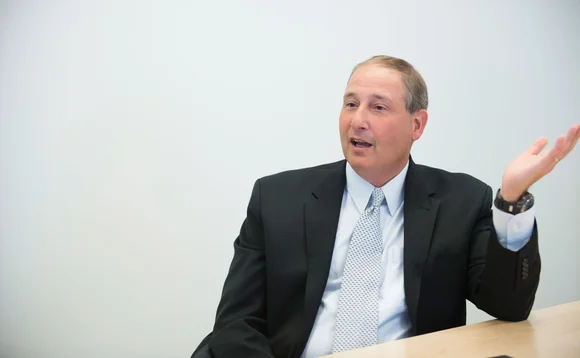Vanguard CIO John Marcante: The Big Leap
The March 2015 Waters Profile









Vanguard CIO John Marcante tells Dan DeFrancesco how events at the midpoint of his career at one of the largest asset managers in the world set the precedent for how the rest of his professional life would pan out.
There are moments in every person's life that define what the next 20 years of their existence will be like. Whether personal or professional, these events serve as tipping points, like the first to fall in a long line of dominoes.
Professionally, happenings such as these often come in the form of a new or different job. Sometimes, a person can pinpoint how a single experience - a foot in the door with a company or a mid-career boost - triggered a series of events that led them to where they are today.
People don't always realize an opportunity when they initially see it though. What will eventually turn out to be a beneficial, life-altering change may not seem so at face value.
Ready or Not
It was the fall of 2001 and John Marcante had a meeting with Vanguard's then CEO and chairman, Jack Brennan. Marcante had joined the firm's IT department in 1993, after a seven-year stint at General Electric (GE). Since joining Malvern, Pa.-based Vanguard, Marcante had worked his way up to head its institutional business technology in 1998.
"It was the dream job," he recalls. "You run a big IT shop with developers working on cool technology. You support cool companies - large institutions that are Vanguard's clients. The sales teams take you out on meetings with prospective clients because they want to talk about technology. You go to clients to implement the technology."
At the time, Vanguard's entire IT department was in a state of flux, as Bob DiStefano, the firm's CIO and one of Marcante's mentors, had passed away a few months earlier. The reason for the meeting on that fateful day, Marcante assumed, was to inform him who his new boss would be.
So when Brennan told him that he would, in fact, be getting a new boss, Marcante smiled, said all the right things and got up to leave. This was news he had expected and was prepared for, but before he had a chance to leave, Brennan told him to sit back down: there was more news. Marcante would also be getting a new job title - head of global technology operations, with a focus on datacenter management and disaster recovery.
Marcante was floored. Not only did he love his current role, but he knew nothing about datacenters. A developer at heart, his experience was in software, not hardware. Feeling upset and uncomfortable, he laid out his concerns to Brennan about what he believed to be a career-limiting move. Brennan's response was simple: "John, if I wanted your opinion, I might have asked for it."
It took a second for the initial shock of the move to settle in for Marcante, who was happy and comfortable in his current position. Datacenter management was new, foreign and something he quite frankly didn't have a ton of experience in.
Brennan was the one to explain to Marcante that the new job was an opportunity, not a setback. Since 9/11, firms in the financial services industry were having problems recovering mission-critical files, making them realize they were not prepared in the event of a disaster. This was a chance for Marcante to look at Vanguard's growth and disaster recovery plans, and build out its next generation of infrastructure.
"I didn't realize he was giving me an opportunity," he says. "Sometimes in your career, and in life, you don't always have the ‘oomph' to take a leap, but you still have to take it."
Making those leaps would become commonplace for Marcante, who left IT in 2004 to work on Vanguard's business side, eventually leading the firm's asset management services in 2006, before returning to IT in 2012 as CIO, his current role.
While Marcante doesn't look back and view his initial move into datacenters as the beginning of a master plan to become CIO, he does appreciate it. That first jump taught him that just because a move doesn't initially feel right, it doesn't mean it is wrong to make it.
"Jack Brennan said to me: ‘Hey, you're the right guy; you will learn. This is the right opportunity,'" Marcante recalls. "I think I had more confidence in myself in later moves, that I brought more to the table. You have to trust yourself a bit. With each move it got a little easier."
Well-Rounded Crew
Marcante tells the Brennan story often and for good reason: It is a microcosm of the career of an IT leader at Vanguard.
Lisa McCann, a principal of IT at the firm, has a career path that mirrors that of Marcante. She held technology leadership roles at Bank One, Intracorp (a vendor subsidiary of Cigna) and Siemens before joining Vanguard in 2000, spending time on both its business and technology sides.
Like Marcante, McCann values the time she has spent working with the front, middle and back offices. Whether it was leading the firm's center for excellence or heading up its strategic technology planning, her time spent on both sides of the fence has helped her to bridge the gap between IT and business.
When McCann returned to IT at Vanguard after serving a few stints on the business side, she ended up running the technology that supported some of the business groups she used to lead. The switch provided her with a clearer view of the situation.
"I've walked in their shoes, so it really is a lot easier for me to understand," McCann explains. "It's one thing to hear, ‘Oh yeah, we have a problem with this.' It's another to actually understand the insights they need; that this is a big issue for them. It helps you put it into perspective."
Such insight helped Vanguard to develop its net promoter score (NPS), often used for external client relationship management, as an IT service provider. The idea, which is backed by Marcante, is to use NPS internally, which will enable Vanguard to evaluate itself more efficiently when taking on new projects.
The feedback Marcante and his team received from NPS has allowed them to build action plans to improve products and service. The delivery was continuous. Years ago, Marcante says, a marketing employee might spend three months planning a presentation on what he or she wanted to elevate and test, but now the entire process has been sped up.
"The NPS is a good way for us to understand our internal business needs and our client needs," McCann says. "It's being able to put yourself into that business user's shoes and really listen to their needs. Now that we use that as a measure, we know how we are doing with our internal clients."
Making an Executive
Having a foot in both the technology and business camps is something Marcante says is vitally important to the make-up of any good IT leader. He believes three competencies are required to make a business leader in general: business acumen, and technical and leadership skills. These qualities are pushed within Vanguard's IT department as being essential to the make-up of all its leaders.
Marcante explains it isn't only important to have a good understanding of the first two components; one has to be able to recognize how they relate to one another. Being able to see how business and technology can overlap is how innovation happens.
The third competency is not only about being a good manager, but having the ability to persuade and influence, manage relationships, and communicate and articulate a vision in order to be effective. "I can't imagine a business executive who doesn't have business acumen, technical and leadership skills," he says.
Following those criteria, Marcante is the prototype for a leader in IT. As an undergraduate at Penn State, he studied business and computer science. He also holds a master's in business administration from St. Joseph's, with a concentration on finance and portfolio management. While at GE, he was enrolled in a two-year information systems management program.
For Marcante, it was never about setting himself up for a specific job in the future. He laughs when people hear his credentials and say he planned on working in IT in the financial services industry. Technology and finance were just two subjects he had a passion for, dating back to when he was a kid and wrote programs with his father, John, a computer engineer at Bethlehem Steel.
"I pursued finance and IT thinking maybe someday I would use it, but at the very least it would make me smarter," Marcante says.
Reinventing the Wheel
As Marcante has expanded his skillset during his time at Vanguard, so too has the firm. It currently has an asset base north of $3 trillion - a figure Marcante admits he never envisioned the company reaching when he joined. Assets under management totaled approximately $127 billion back in 1993.
When Marcante moved back into IT in mid-2012, he had the opportunity to step back and evaluate the landscape of the company. One key thing at the time was its globalization. Marcante understood Vanguard couldn't take what it was currently doing and expect it to work globally without tweaking its business model.
The old idea of planting a bunch of individual seeds, letting them grow and then recapturing them as part of your business was not going to work, he says. Volatility throughout the markets meant big, long IT projects were no longer an option. The global solution was one that was nimble, quick to deliver, and offered scalability that would underpin the firm's growth.
Marcante and his team eventually built a flywheel; a concept developed by author Jim Collins, specifically for IT. The wheel is made up of five spokes representing Vanguard's core values and objectives, starting with establishing strong partnerships with clients by understanding the business and ending with implementing risk measures and controls with respect to cyber security. At the center of the wheel is a group of engaged and diverse employees or "crew," as Vanguard refers to them.
While the flywheel is a team effort, it's a classic example of Marcante's approach to problems.
McCann describes him as being charismatic. "He gets you excited about things that are happening. He can take a challenging situation and make it into an opportunity; turn it into something that's very positive," she says. "He can help you see the possibilities out there. That's what I think makes the difference. I think he's been a really good change agent for us in IT at a pivotal time."
Opportunities
For Marcante, it has been a career full of opportunities, which he has taken head on, irrespective of whether he had a choice about it. Even before his Vanguard tenure and the fateful meeting with Brennan, Marcante was looking for new challenges. While at GE, he rose through the ranks, taking on leadership roles early on, despite having worked at the company for less than a decade.
So why did he choose to leave one of the world's largest conglomerates and move to a then-burgeoning investment management firm?
"The attraction with joining a young and growing company is that you are going to be thrown in the fire," Marcante says. "Before you're even ready to take on that next role, it may just be there for you to take because the company is growing. I think that's a great position to be in."
Fundamental data
Name: John Marcante
Title: CIO, The Vanguard Group
Birthplace: Allentown, Pa
Age: 50
Vanguard Assets Under Management: $3.1 trillion
Education: BS in business and computer science from Penn State; MBA in finance and portfolio management from St. Joseph's
Hobbies: Surfing, tennis
Fun fact: Marcante is a published author. His novel, Raphael, is a story about an arch angel who is granted his wish of being able to walk among humans and experience emotions
Only users who have a paid subscription or are part of a corporate subscription are able to print or copy content.
To access these options, along with all other subscription benefits, please contact info@waterstechnology.com or view our subscription options here: http://subscriptions.waterstechnology.com/subscribe
You are currently unable to print this content. Please contact info@waterstechnology.com to find out more.
You are currently unable to copy this content. Please contact info@waterstechnology.com to find out more.
Copyright Infopro Digital Limited. All rights reserved.
As outlined in our terms and conditions, https://www.infopro-digital.com/terms-and-conditions/subscriptions/ (point 2.4), printing is limited to a single copy.
If you would like to purchase additional rights please email info@waterstechnology.com
Copyright Infopro Digital Limited. All rights reserved.
You may share this content using our article tools. As outlined in our terms and conditions, https://www.infopro-digital.com/terms-and-conditions/subscriptions/ (clause 2.4), an Authorised User may only make one copy of the materials for their own personal use. You must also comply with the restrictions in clause 2.5.
If you would like to purchase additional rights please email info@waterstechnology.com
More on Emerging Technologies
This Week: Startup Skyfire launches payment network for AI agents; State Street; SteelEye and more
A summary of the latest financial technology news.
Waters Wavelength Podcast: Standard Chartered’s Brian O’Neill
Brian O’Neill from Standard Chartered joins the podcast to discuss cloud strategy, costs, and resiliency.
SS&C builds data mesh to unite acquired platforms
The vendor is using GenAI and APIs as part of the ongoing project.
Chevron’s absence leaves questions for elusive AI regulation in US
The US Supreme Court’s decision to overturn the Chevron deference presents unique considerations for potential AI rules.
Reading the bones: Citi, BNY, Morgan Stanley invest in AI, alt data, & private markets
Investment arms at large US banks are taken with emerging technologies such as generative AI, alternative and unstructured data, and private markets as they look to partner with, acquire, and invest in leading startups.
Startup helps buy-side firms retain ‘control’ over analytics
ExeQution Analytics provides a structured and flexible analytics framework based on the q programming language that can be integrated with kdb+ platforms.
The IMD Wrap: With Bloomberg’s headset app, you’ll never look at data the same way again
Max recently wrote about new developments being added to Bloomberg Pro for Vision. Today he gives a more personal perspective on the new technology.
LSEG unveils Workspace Teams, other products of Microsoft deal
The exchange revealed new developments in the ongoing Workspace/Teams collaboration as it works with Big Tech to improve trader workflows.








